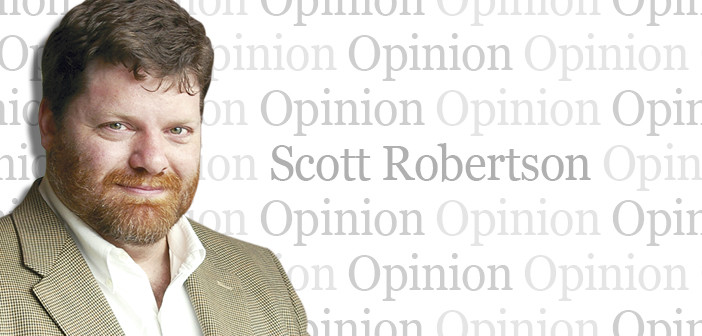By Scott Robertson
I was asked this week why we have turned off the “comments” section of our website, jcnewsandneighbor.com. My answer was that I hadn’t had the opportunity to have the site built without a comments section in the first place. I was then asked in polite terms if I didn’t feel we were stifling the conversation.
Gracious, no. I have been reading news online since Prodigy was my service provider and I have yet to see a discussion about a general news story in an open comments section that 1) was more than a few comments long, and 2) limited itself completely to rational discourse regarding the salient facts of the story.
I’m not saying such discussions are impossible to find in other venues. I recommend the Wall Street Journal site for examples of generally thoughtful discourse regarding news stories. How, you may ask, does WSJ.com hold at bay the nattering nabobs of negativism who howl and growl in open comments sections?
There are three basic means:
• Everyone who comments at WSJ.com has paid to for the privilege. The principle is the same that allows posh clubs to remain polite, civil places despite the serving of alcoholic beverages. When an intemperate individual walks into a random bar, he may become obnoxiously drunk, call the bouncer’s mother a rude name and walk away with nothing more than a black eye. He may even re-enter the first bar just a few nights later. However, should the same individual pay a steep dues check for membership in an upstanding club, he will think twice before behaving in a manner that would lead to expulsion from the club with no recompense. Just so, wags and gadflies will generally not pay $32.99 a month only to be quickly blacklisted.
• The list of rules for commenting on stories on WSJ.com is a 787-word document that includes a 217 word definition of “objectionable content” plus seven separate links to other pages for clarification. This stands in stark contrast to the list of rules for commenting on general news stories in most media site open comments sections, which can be summed up, “Y’all behave.” On those sites, the “punishment” for posting objectionable content is generally that the account accompanying one’s email address is closed. Do you know how long it takes to set up a new free email address and get back on the same site? Fewer than five minutes. Because there’s no accountability direct to the commentor, there’s no threat for misbehavior. It’s like Robin Williams once said about English policemen not having guns – all they can do is yell, “Stop…or I’ll say stop again.” Which brings us to 3).
• WSJ.com requires that all commentors use their real, full names. These names are checked against the credit cards used to open the accounts, not just email addresses. Few things, with the exception of the over-consumption of whiskey, grant courage in quite the way anonymity does. Just as Charles Edward Montague, the English novelist and essayist, wrote in 1922 that, “There is no limit to what a man can do so long as he does not care a straw who gets the credit for it,*” it is apparent almost a century later that there is no limit to what a man will say so long as he does not believe he will be held accountable for it.
This is why I am so pleased several of our Washington County commissioners have begun holding town hall style meetings with their constituents, eschewing web comment/talk radio middlemen and going straight to their own constituents for guidance. The constituents are there, face to face, with both the commissioners and the constituents being responsible for the things they say.
There’s nothing that says the commissioners have to hold these meetings. They’re just taking responsibility for talking directly with those whom they represent.
This just enrages the wags and gadflies, of course. Suddenly, they don’t matter. The commissioners are hearing directly from the people who do matter, and that’s what counts.
Going back to the original question that started this column, “Why have we turned off the comments section of our website?” I will say this. I am generally pleased when folks comment to me regarding our work. As writers who care about our community, we are certainly not writing to be ignored. But we are somewhat old school. Constant comment is a media phenomenon born of TV news channels having to fill 24 hours of programming every day without having 24 hours worth of news every day, and of the Internet’s ease of communication.
Can you imagine Edward R. Murrow or Walter Cronkite opening the phone lines during the CBS Evening News? Of course not. They knew their role was to provide news and editorial content, then to let everyone else make of it what they would. That wasn’t stifling conversation. It was informing it. And it still is.
*An Americanized version of this quote has been attributed to President Harry S. Truman and UCLA Head Basketball Coach John Wooden.





